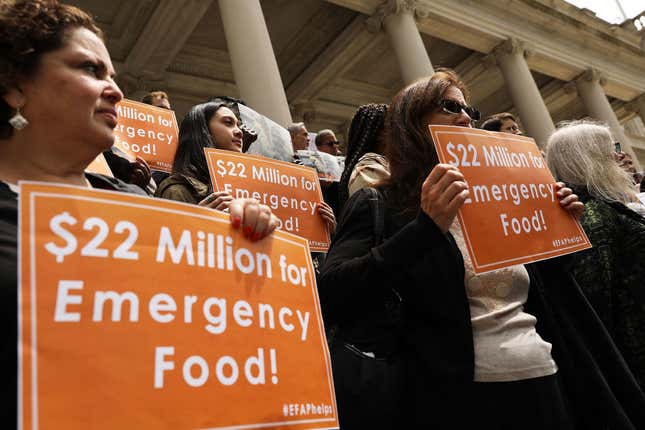
This week we found out that unhealthy diets account for about 11 million deaths worldwide each year. Donald Trump wants to raise that number by at least 750,000.
Three-quarters of a million people—that’s how many could lose their benefits under the Supplemental Nutrition Assistance Program, or SNAP, later this year under a new proposal from the White House, according to NPR. The proposal is meant to encourage “able bodied adults without dependents” (ABAWDs) to go to work, but it’s based on the wrong assumption that these people are lazy and haven’t already been seeking jobs. It’s not only a classist sentiment; it’s also racist.
Craig Gundersen, professor of agriculture and consumer economics at the University of Illinois at Urbana-Champaign, tells NPR, “This idea that people are ripping off the system or something, that’s just not true.”
The payoff isn’t that big for someone looking to “cheat the system.” According to statistics from the Center on Budget and Policy Proposals, the average monthly benefit from SNAP, formerly known as food stamps, was only $126 per person in 2018. It is true, however, that selling SNAP benefits for cash is illegal and considered to be defrauding the government. This method of “fraud” is on the rise. But many feel that exchanging a $125 food voucher in order to have cash to pay other bills, or other means of survival, isn’t behavior worthy of being demonized or criminalized; it’s a method of survival for those who need help the most.
Supporters of the bill claim it should be easy to find jobs in this better economy and job market; but the bill ignores the barriers to work that many people face. Parents, for instance, are often limited to finding employment that won’t conflict with their kid’s school schedule because the cost of before- and after-school programs is outrageous. Many poor people can’t afford cars to travel to work (or a volunteer site, or job training), and in rural areas, public transportation often isn’t available. Formerly incarcerated people are ineligible or overlooked for many positions; the homeless, drug-addicted and mentally ill struggle as well.
With this newly proposed plan, SNAP assistance would stop after three months for those without disability unless they find employment, get job training or volunteer for at least 20 hours a week. That’s not a new law; the requirement has been in place for years. Still, many states waive the requirement because they understand how cruel it would be to those who genuinely need the assistance. The Trump administration now wants to make waivers much harder to get.
The proposed bill is poorly conceived in other ways too. For instance, if almost 1 million people are forced into job training programs as planned, it would overload training offices that weren’t designed to handle the masses of people now facing this requirement. A backlog would quickly ensue.
Food justice advocates agree that solutions to hunger are systemic, not personal. Most people using food assistance have been pushed to the margins of society through unjust systems, not through lack of trying. These oppressive systems and administrators are not simply “unaware” of the devastating effects they’ve had. Pull yourself up by the bootstraps legislation like this one threatens to leave our most vulnerable communities in real danger, and they know this.
Congressional Democrats have threatened to sue if the bill passes, but this bill hasn’t stood alone. It’s part of a broader effort by this classist and racist administration to make government aid of any kind harder to come by. Last week a federal judge blocked Kentucky and Arkansas from enforcing the Medicaid work rule, calling it more inhumane bullshit “arbitrary and capricious.”
Correction: April 8, 2019, 7:09 a.m. ET: This post has been updated to correct the acronym for ABAWDs (Able Bodied Adults Without Dependents).
Correction: Sept. 22, 2019, 4:50 p.m. ET: This story has been edited to clarify the number of deaths worldwide attributed to poor diet and correct the year pertaining to the SNAP average monthly benefit. It has also been edited to remove unattributed text and to add fuller sourcing.

